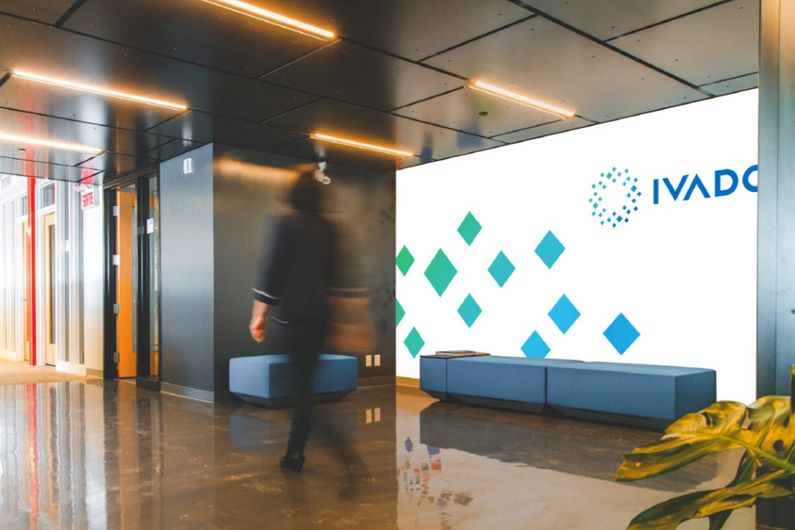Major new grant will change the face of AI
- UdeMNouvelles
04/28/2023
- Béatrice St-Cyr-Leroux
Université de Montréal has just been awarded $124.5 million to spearhead a paradigm shift in AI.
Université de Montréal is poised to revolutionize research in artificial intelligence thanks to a generous grant from the Canada First Research Excellence Fund.
The $124.5 million in funding will be used to launch R3AI, a cutting-edge initiative that promises to build a future based on an AI that is “robust, reasoned and responsible” (the three R’s ). The objective is to better meet the needs of modern societies by closing the gap between AI and human intelligence through interdisciplinary research.
This initiative will be led by UdeM in partnership with Polytechnique Montréal, HEC Montréal, Université Laval and McGill University, under the banner of IVADO, an AI research centre created with funding from the Canada First Research Excellence Fund in 2016.
“The grant that we received from the Canada First Research Excellence Fund in 2016 accelerated the technological development of automated decision-making approaches,” explained Marie-Josée Hébert, UdeM's vice-rector of research, discovery, creation and innovation.
“And now this new grant will help us cross the next frontier in the development of robust algorithms designed and constructed in a responsible and ethical manner.”
Front and centre in R3AI will be the task of preventing potential dangers of AI systems (due to built-in biases, for example) and implementing a rigorous framework to guide algorithm development.
This is why one of the first steps will be to “develop AI systems that are more modular, advanced and explainable, and that also integrate human needs and concerns right from the design stage,” explained Luc Vinet, IVADO’s chief executive officer.
Broad cross-sectoral initiative
Both Hébert and Vinet stress the importance of interdisciplinary approaches and the pooling of diverse expertise to achieve this paradigm shift that will encompass the sciences, health sciences, natural sciences and engineering.
Université de Montréal and IVADO certainly provide the fertile ground needed for such a synergy of knowledge and know-how, given their deep presence in so many disciplines. This is reflected in R3AI’s nine research groups: AI and the neurosciences, machine learning, the environment, natural language processing, molecules, health, EDI (equity, diversity and inclusion) and supply chains.
These groups will be working to build AI systems capable of discovering new materials and molecules, enhancing climate change resilience, developing “learning health systems,” and resolving major supply chain issues, among many examples.
The plan is to then ensure that these scientific and technological advances benefit society. To this end, R3AI’s 150 partners from industry, government and academia will receive training in how to foster responsible adoption of AI.
AI serving the common good
At a time when AI is receiving extensive media coverage and experts around the world are calling for responsible development of AI, Vinet believes the R3AI project “goes straight to the heart of these concerns by directly tackling the issues raised by this transformative technology.”
And, as Hébert pointed out, Université de Montréal has long shared this vision of ethical AI and it is committed to acting in line with this ideal.
“Because of our unique position and research expertise, because we have the capacity to assemble a wide range of disciplines, and because AI was developed in part in our Department of Computer Science and Operations Research,” said Hébert, “we have an institutional and collective responsibility to help develop AI in a way that minimizes the risks involved and maximizes the benefits for all.”
IVADO's success stories
IVADO is young but has already accomplished so much. Since 2017, through the combined strengths of its 225 professors at 22 Canadian universities and its partners in industry, it has launched more than 575 projects totaling more than $77 million.
One success story is IVADO's partnership with BrainBox AI to create smarter, greener and more energy-efficient buildings. The goal was to develop AI technology that reduces the carbon footprint of buildings through intelligent management of their heating, ventilation and air conditioning systems, and today a number of Quebec companies are seeing tangible results: up to 40 per cent reductions in their buildings' carbon footprint and up to 25 per cent in their total energy costs.
In the health sector, too, IVADO has helped the Montreal startup Gray Oncology Solutions develop a platform to optimize the scheduling of radiotherapy treatments in cancer centres. The GrayOS platform is now being tested at the Centre intégré de cancérologie of the CHUM, Université de Montréal's affiliated hospital complex, as IVADO continues to support the project.















